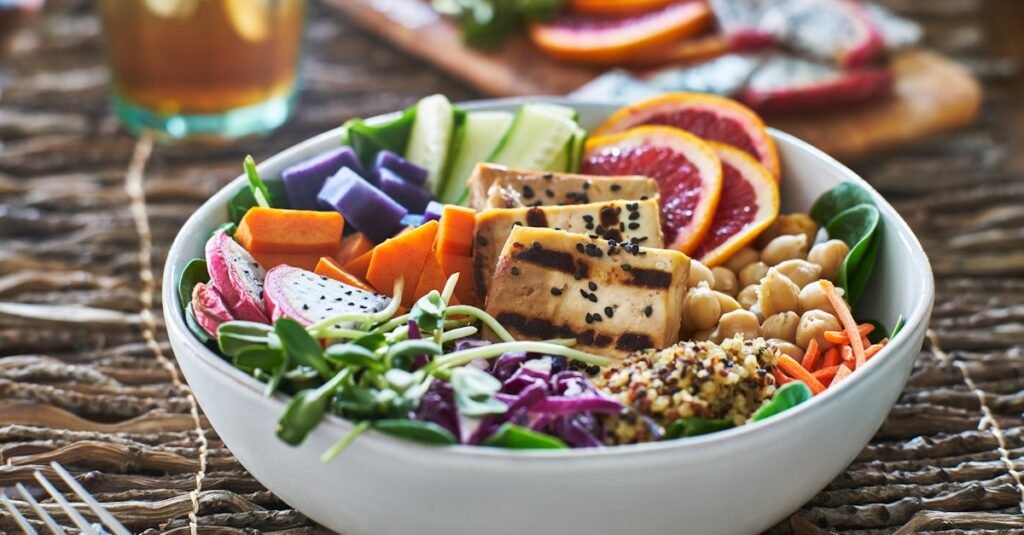A plant-based diet has been gaining popularity in recent years, with many people choosing to go vegan for various reasons. One common misconception about vegan diets is that they lack sufficient protein. However, there are numerous plant-based sources of protein that can provide all the essential amino acids needed for a healthy diet.
Protein plays a crucial role in the body, serving functions such as driving chemical reactions, providing structure to cells, and producing essential molecules like neurotransmitters and hormones. The Dietary Guidelines for Americans recommend that protein should make up 10-35% of your daily food intake, but individual requirements vary based on factors like body size and activity levels.
Fortunately, there are plenty of delicious and nutritious plant-based sources of protein for vegans to choose from. Here are 17 options to consider:
1. Edamame: These immature soybeans are a great source of protein, with over 18g per cup, as well as fiber, magnesium, and other nutrients.
2. Lentils: With 18g of protein per cup, lentils are also rich in fiber and linked to improved gut and heart health.
3. Beans: Black beans and kidney beans offer 15g and 13g of protein per cup, respectively, along with numerous health benefits.
4. Split peas: Cooked split peas provide over 16g of protein per cup, as well as iron, fiber, and potassium.
5. Tofu: This soybean product contains 15g of protein per quarter block, along with iron and calcium.
6. Whole wheat pasta: A cup of whole wheat spaghetti has 7g of protein and is a good source of fiber and essential nutrients.
7. Oats: Cooked oats offer 6g of protein per cup, along with cholesterol-lowering beta-glucan fiber.
8. Khorasan wheat: Also known as Kamut, this ancient grain provides almost 10g of protein and 7g of fiber per cup.
9. Teff: This nutty-tasting seed contains nearly 10g of protein per cup and is a good source of iron and B vitamins.
10. Amaranth: Cooked amaranth offers over 9g of protein per cup, as well as manganese, magnesium, and other nutrients.
11. Quinoa: Classified as a whole grain, quinoa provides 8g of protein per cup, along with fiber and essential nutrients.
12. Hemp seeds: Three tablespoons of hemp seeds offer over 9g of protein and healthy fats.
13. Sunflower seeds: An ounce of sunflower seed kernels contains 5g of protein, fiber, and important vitamins and minerals.
14. Pumpkin seeds: Pumpkin seeds provide 8g of protein per ounce and are a great source of magnesium.
15. Peanut butter: Two tablespoons of peanut butter contain 7g of protein, healthy fats, and essential nutrients.
By incorporating these plant-based sources of protein into your diet, you can ensure that you are meeting your nutritional needs while enjoying a variety of delicious and nutrient-rich foods. Vegan diets can be both healthy and satisfying when balanced with a diverse range of plant-based protein sources. When it comes to following a vegan diet, it’s important to be mindful of the ingredients in the foods you consume. Some peanut butters, for example, contain honey, which is not considered vegan-friendly. It’s essential to read labels carefully and choose products that align with your dietary preferences.
Nutritional yeast is a popular cheese substitute that is derived from the inactive form of Saccharomyces cerevisiae, a type of yeast commonly used in beer and bread production. Not only is nutritional yeast a complete protein source, but a half-ounce serving also provides 8 grams of protein. Additionally, nutritional yeast is rich in various B vitamins, which play a crucial role in energy production and red blood cell formation.
Meat alternatives, such as plant-based burgers, sausages, and chicken substitutes, can be excellent sources of protein for vegans. However, it’s important to note that the nutritional content of these products can vary significantly. While plant-based alternatives are generally healthier than their meat counterparts, it’s best to consume them in moderation. Opting for minimally processed plant foods is usually the healthiest choice for a well-rounded vegan diet.
In summary, vegan diets exclude meat and animal products, but with careful planning, you can meet your protein needs through plant-based sources. Legumes, grains, nuts, and seeds are all excellent sources of protein for vegans and also provide essential vitamins and minerals to support overall health.
If you’re looking for personalized nutrition advice tailored to your individual needs, consider taking our free quiz to get started on your journey to optimal health. Remember to choose vegan-friendly options and prioritize whole, minimally processed plant foods for a balanced and nutritious diet.

